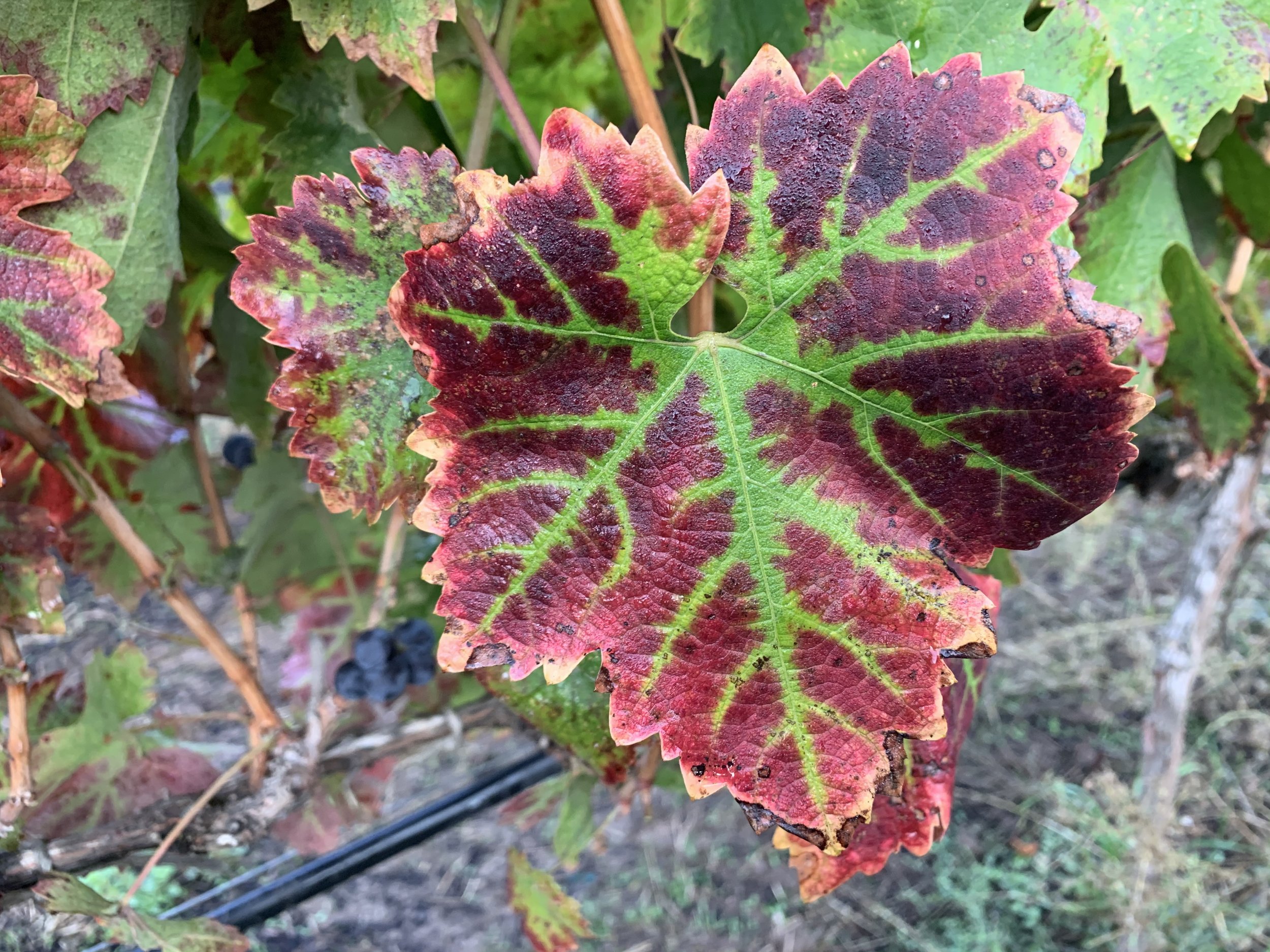Natural Disasters
Hail, fire, and frost are dramatic natural disasters faced by farmers. Winemakers worldwide have suffered cataclysmic devastation from these forces of nature — more than in the past during these last years. However, some natural disasters are not dramatic. Many agricultural disasters are sensational events where the damage is done in minutes. As catastrophic as these events are, agriculture has slow-motion catastrophes with results as dire.
While we at Troon have been fortunate enough to avoid the more dramatic disasters, we have not been lucky with the slow-motion ones. In our case, the disaster has been from a microscopic enemy — the red blotch virus. We are all familiar with viruses after the last several years, but plants, too, can be devastated by viruses. This disease shows itself as you approach harvest; suddenly, the green disappears from the leaves to be replaced by brilliant red color in many red varieties. This shuts down photosynthesis in the vines and prevents the grapes from fully ripening. The color change may look like beautiful fall colors, but it is a symptom of the vines slowly dying.
In 2018, testing confirmed the worst; one hundred percent of the vines at Troon Vineyard were infected with the red blotch virus, so we were forced to embark on a five-year project to replant our entire vineyard. We are now in year five. Our replanting project called for ten acres a year — pull out ten and replant ten. Our goal was to maintain our production as best we could during this process, but there was going to be a vintage during this transition where we would fall short of our production goals. We are now at that point.
After this year’s harvest, we pulled out the last of the old, virus-infected vines. It is always bittersweet to remove even diseased vines — but this last group was especially hard. These were the last of the vines that were here when I arrived in 2016 and, due to a concentrated effort by our entire team, we brought them back to the best health they had been in for years. For the last two vintages they had done their best to give us the finest fruit they’d produced during our time with them. We will always remember their heroic struggle through these last years and the wines they gave us — and you.
The positive part of our total replant project is that we could select the ideal varieties for the Applegate Valley and plant them in the right spots on our vineyard. We are confident that the wines from these varieties will begin an exciting new era for Troon Vineyard and the Applegate Valley. Of course, this new era is defined not only by these new vines and varieties but by our regenerative biodynamic farming, which embraces the whole farm concepts of biodynamics and the biodiversity that encompasses.
During this replant we have transformed from Troon Vineyard to Troon Vineyard and Farm. From a vineyard, we have grown to include cider apples, a vegetable garden, re-wilded honeybees, sheep, chickens, wildlife, dogs, humans, and, of course, grapevines. While this portends a cornucopia of produce and wine in the future — for now, it means that we are only working towards that vision. Production and promise have not yet aligned.
Due to our replant, 2022 brought us to a low point in our wine production — 2023 will not be much better. But now our spirits are rising with the promise of the future. Each year moving forward will bring these newly planted vines into production and, as our first plantings begin to mature, production will increase each vintage. Best of all, we are now on an exciting voyage of discovery as we learn what wines these new vines want to give us. In the garden, the work over the last years will result in our first real harvest for our farm stand this summer. This year, the cider apple trees, whiles still years from full production, could give us enough apples for a small batch of Troon Apple Cider, not for sale, but just for fun and learning at this point.
The pain of taking away has now been totally replaced by the work of building and moving forward. Our sadness in pulling old vines is now replaced by our excitement for what new vines may create. There is a spiritual energy to all of this, not a religious one, but a connection to life, the Earth, and the cycles that tie all of these things together. While the old vines are gone, the imprint they left on our soils will give them a voice in our new wines.
There is a new freedom for all of us at Troon Vineyard in letting go of the past and embracing the future of the farm. That freedom and energy will be expressed in the new wines we make and the produce we grow.
It is the beginning of a new era for our farm — and for those of us that work it.
